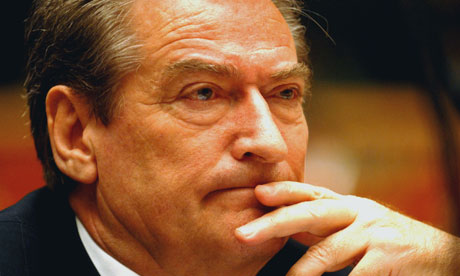Albania calls in war crimes team over organ theft claim
Senior officials continue to dismiss claims that Serb captives were smuggled into northern Albania and killed

Albania last night invited an international criminal inquiry into claims that organs were taken from murdered Serbs there after the Kosovo war.
The prime minister, Sali Berisha, said EU-sponsored investigators based in Kosovo and officials at the war crimes tribunal in The Hague would be formally invited to open inquiries.
Senior officials in Albania, however, continue to dismiss claims made in aCouncil of Europe report that Serb captives were smuggled into northern Albania by the Kosovo Liberation Army (KLA) and killed. The report,which was leaked to the Guardian and will be debated at the parliamentary assembly next month, alleged that a handful of captives were taken to a makeshift clinic near Albania's capital, Tirana, where they were shot in the head and their kidneys were removed.
In comments reported on Albanian television, Berisha said that the Council of Europe report was "not based on fact or real information". He added that Dick Marty, the Swiss politician who led the inquiry, was "well-known for his anti-Kosovo stance".
However, in a surprise move, Berisha added: "We want EULEX [the EU-sponsored justice mission in Kosovo] to investigate. We offer the full co-operation of Albania. The justice minister will send a special letter to The Hague. The Hague will not have any limitation on its investigations in Albania."
Albania has previously been accused of resisting inquiries into the allegations concerning KLA detention facilities in the north of the country.
Philip Alston, a special UN rapporteur on extrajudicial killings, told a press conference in Tirana in February that Albanian officials had played "diplomatic ping pong" and stalled investigations. There had been "no meaningful cooperation from Albania", he said.
"The [Albanian] government should do everything it can to facilitate an independent and objective investigation by the international entities investigating abuses," he added.
Council of Europe investigators are understood to have been among those who, according to Alston, received only limited assistance from Albania during their inquiries.
Members of the Council of Europe's parliamentary assembly are being heavily lobbied over Marty's report, which they will be asked to adopt at the end of January. The report has already been endorsed by the council's influential legal affairs committee.
Council of Europe parliamentarians are understood to have requested to see evidence cited in Marty's report, which bases its claims on first-hand testimony from alleged witnesses to war crimes as well as FBI and MI6 intelligence reports.
In Kosovo the newly-elected prime minister, Hashim Thaçi, has also suggested that the claims should be investigated. He is accused in the report of heading a criminal network with links to the heroin trade and organ trafficking.
Thaçi has strongly denied the allegations, but said yesterday that an independent investigation was needed to "dispel the mist" in Marty's report. Maintaining his position that the report was designed to undermine Kosovo's declaration of independence from Serbia, Thaçi added he had "nothing to hide" and pledged that Kosovo authorities would be "very co-operative" in dealing with allegations.
Thaçi has been in talks to form a coalition government since his party won the most votes in disputed elections earlier this month.
The AKR party (New Kosovo Alliance), which is believed to be considering entering into partnership with Thaçi, has reportedly said that it will not share power with any officials who are under investigation.
Senior AKR figures cast doubt on the veracity of Marty's report, but said that if it is formally adopted by the Council of Europe next month Kosovo would need to co-operate with international investigators
Inga kommentarer:
Skicka en kommentar